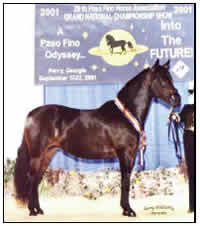|
|
|


By Rob Bracken, student volunteer at the Equine Research Centre:
helping to bring research and horse health news to the industry.
|
From
auction to Grand National champion…
With a little help from her veterinarian
|
It was September 2000,
and Denise Boorman, owner of Maple Leaf Paso Stables in Alliston, Ontario,
was at the annual Paso Fino Horse Auction in Perry, Georgia. As she checked
out the horses, one Paso Fino caught her eye. Catalina del Paso was a
diamond-in-the-rough.
After being outbid at the auction Boorman was disappointed, but her interest
in the horse was far from over. Catalina was sold upon arriving in Miami
to a Colombian gentleman for his daughter. A few months later he called
Boorman, knowing of her interest in the horse, stating that Catalina had
too much“brio” (spirit) for his daughter to handle and he was
willing to sell. Boorman’s project began.
Catalina remained in Miami and continued her training. In March 2001,
Boorman and her husband went to Miami to attend a show and bring Catalina
home. At the show Boorman noticed Catalina was not eating well, and her
performance was lethargic. These responses were put down to Catalina’s
reaction to the vaccines necessary for traveling to Canada. Three weeks
after returning home to Alliston, something was wrong: the same horse
that had too much brio for a young Colombian girl was still lazy, and
one day she would
not get up and had not eaten her grain. Suspecting colic, Catalina was
treated at
home. Over a period of 36 hours she did not respond to the treatment.
With the unknown cause of her continuing distress, Catalina was brought
to the Ontario Veterinary College (OVC) at the University of Guelph, home
of some of the best veterinary talent and
facilities in the world.
 |
Catalina
del Paso survived the removal of a football-sized obstruction from
her intestine
and went on to become a world champion. You can read more about the
latest research on entroliths in the Research Features section of
our website at www.erc.on.ca |
“When I first
saw Catalina, she was distressed and in a lot of pain. After a physical
exam, we concluded that surgery was required,” said Dr. Antonio Cruz,
a gifted surgeon at the Large Animal Clinic. Her condition had become
quite serious: she had a massively distended belly and could not pass
anything. Things did not look good.
Dr. Cruz and his team went ahead with the surgery and discovered several
“enteroliths” in her large colon. One, the size of a baseball,
was blocking her small colon causing the gut to distend. An enterolith
develops when minerals build up around a small foreign object in the intestine
of an animal. Sometimes they become large enough to cause serious health
problems and can be fatal. “The rocks he removed created a cluster
of about the size of
a small football. It is a miracle she survived. Dr. Cruz did a brilliant
job,” said Boorman.
After a few days of additional treatment at the OVC she was released.
She was to be
kept in a stall for a while, but after only a few days Catalina would
have no more of it.
“She was so eager to go, we decided to turn her out early,”
said Boorman. But her trials
were not over.
Ten days after returning from the OVC, Catalina fell into a sinkhole up
to her shoulders. “I couldn’t believe it. I screamed!”
said Boorman. Miraculously, she was unharmed. “It took eight wheelbarrows
of sand to fill that hole.”
Catalina was soon being ridden again. Not only was she active, but also
she was performing far beyond expectations. Boorman decided to continue
slowly with
the training, and to the amazement of everyone, Catalina was ready to
return to competition by the first weekend in July.
In her second show, a regional qualifier, she put on a brilliant performance
and won everything in Bella Forma (conformation). This was only the beginning
of a string of
inspirational performances. In September she took the National Championship,
and
went on to win the ultimate prize: the Grand National Championship. Practically
overnight a new star had emerged, leaving everyone in awe. A horse that
was
supposed to be in post-operative recovery had cleaned up at the highest
level of
competition! Catalina dominated the show circuit, racking up 500, then
1000 points
in only five weeks. To put that into perspective, an average horse collects
200-
300 points in its entire career. She was the #1 Conformation Champion
in the Paso
Fino World in 2001.
Boorman speaks with admiration of Dr. Cruz and the OVC in Guelph. “The
care they took of Catalina was outstanding, and we cannot thank them enough.”
Cruz himself remains modest of his part in this success story. “I’m
just doing my job and I love animals. My main concern is that the horse
leaves healthy so that my client is satisfied. I am equally happy to do
this whether it’s a decorated champion or someone’s companion.”
www.erc.on.ca
|

